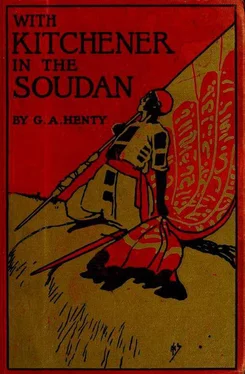"I am glad to be gone, master; the smells here are as bad as they were at Omdurman when we went in there."
" Yes, I am very glad to be off too."
An hour later they started, and arrived at Mugatta at eight o'clock in the evening. The native with whom the camels had been left had taken good care of them, and after rewarding him and taking a meal Gregory determined to start at once. The stars were bright, and there was quite light enough for the camels to travel. The water was emptied from the skins and filled again. They had brought with them sufficient food for four days' travel, and a sack of grain for the camels. An hour after arriving at the village they again started.
"We will follow the river bank till we get past the country where the bushes are so thick, and then strike west by north. I saw by Colonel Parsons' map that that is about the line we should take."
They left the river before they reached El Fasher, and continued their journey all night and onward till the sun was well up; then they watered the camels (they had this time brought with them a large half-gourd for the purpose), ate a good meal themselves, and after placing two piles of grain before the camels, lay down and slept until five o'clock in the afternoon.
" We ought to be opposite Omdurman to-morrow morning. I expect we shall strike the river to-night. I have kept our course rather to the west of the direct line, on purpose; it would be very awkward if we were to miss it. I believe the compass is right, and I have struck a match every hour to look at it; but a very slight deviation would make a big difference at the end of a hundred and fifty miles."
It was just midnight when they saw the river before them.
" We can't go wrong now, Zaki."
"That is a comfort. How many miles are we above its junction with the White Nile?"
" I don't know."
They rode steadily on, and day was just breaking when he exclaimed: " There are some buildings opposite. That must be Khartoum. We shall be opposite Omdurman in another hour."
Soon after six o'clock they rode down to the river bank opposite the town, and in answer to their signals a large native boat was rowed across to them. After some trouble the camels were got on boai'd, and in a quarter of an hour they landed.
"Take the camels up to my house, Zaki; I must go and report myself at head-quarters."
General Eundle had not yet gone out, and on Gregory sending in his name he was at once admitted.
"So you are back, Mr. Hilliard!" the General said. "I am heartily glad to see you, for it Avas a very hazardous mission that you undertook. What news have you?"
" This is Colonel Parsons' report."
Before reading the long report the General said, " Tell me in a few words what happened."
" I overtook Colonel Parsons at Mugatta on the third morning after leaving. We were attacked by nearly four thousand Dervishes five miles from Gedareh. After a sharp fight they were defeated, and we occupied the town without resistance. Four days later Fadil came up with his army and attacked the town, but was driven off with a loss of five hundred men. He is now eight miles from the town. The place is unhealthy, and although it can be defended, Colonel Parsons has asked for reinforcements to enable him to attack Fadil."
"That is good news indeed. We have all been extremely anxious, for there was no doubt that Colonel Parsons' force was wholly inadequate for the purpose. How long is it since you left?"
" About forty-six hours, sir."
"Indeed! that seems almost impossible, Mr. Hilliard."
" We started at eleven o'clock in the morning, sir, and rode on donkeys to Mugatta, where I had left my camels; arrived there at eight, and started an hour later on the camels. We rode till nine o'clock the next day, halted till five, and have just arrived here. The camels were excellent beasts, and travelled a good six miles an hour. I did not press them, as I knew that if we arrived opposite the town at night, Ave should have difficulty in getting across the river."
" It was a great ride, a great achievement! You must be hungry as well as tired. I will tell my man to get you some breakfast at once. You can eat it while I read this dispatch. Then I may have a few questions to ask you. After that you had better turn in till evening."
Gregory enjoyed his breakfast with the luxuries of tinned fruit after his rough fare for the past fortnight. When he went to the General's room again the latter said:
" Colonel Parsons' dispatches are very full, and I think I quite understand the situation. No praise is too high for the conduct of his officers and troops. All seemed to have behaved equally well, and he mentions the gallant part you took in the defence of the baggage with Captain Kuthven and the doctor, and only some thirty-four soldiers of the camel corps. Now I will not detain you longer. I hope you will dine with me this evening; I should like to hear more of the affair."
Eeturning to his hut, Gregory found that Zaki had already got his bed and other things from the store, and he was just about to boil the kettle.
"I have breakfasted, Zaki. Here is a dollar. Go to one of those big shops and buy anything you like, and have a good meal. Then you had better take the camels across to Azim's camp. I shall not want you then till evening."
No time was lost. Three battalions and a half of Soudanese were sent up the Blue Nile in steamers, and the garrisons stationed at several points on the river were also taken on board. Three companies of camel corps marched along the bank and arrived at Abu Haraz, a hundred and thirty miles up the river, in fifty-six hours after starting. Five hundred baggage camels were also sent up. As the distance from Gedareh to this point was a hundred miles, and as water was only to be found at one point, it was necessary to carry up a supply for the troops. Colonel Collinson, who was in command, pushed forward at once with the 12th Soudanese and the camel corps. When Fadil heard of their approach he made a night attack on Gedareh. This, however, was easily repulsed by the garrison. He then broke up his camp and marched away, intending to cross the Blue Nile and join the Khalifa.
His troops were greatly demoralized by their failures, and in spite of the precautions he took, the Darfur Sheik, with five hundred of his men, succeeded in effecting his escape, and at once joined us actively in the further operations against Fadil. As there was no further danger the Soudanese marched back again and joined the other battalions, the garrisons on the river were re-established, and part of the force returned to Omdurman. The Sirdar had returned from Fashoda before Gregory came back, and had left almost immediately for Cairo. On the day after Gregory's return he had a sharp attack of fever, the result partly of the evil smells at Gedareh, heightened by the fact that the present was the fever season in the Blue Nile country.
CHAPTER XXII
THE CROWNING VICTORY
IT was eight Aveeks before he recovered, and even then the doctor said that he was not fit for any exertion. He learned that on the 22nd of October, Colonel Lewis, with two companies of the camel corps and three squadrons of Lancers, had started from Omdurman to visit the various villages between the White and Blue Niles, to restore order, and proclaim that the authority of the Khedive was established there. On the 7th of November, following the Blue Nile up, he reached Karkoj, but a short distance below the point at which the navigation of the river ceased. He had come in contact with a portion of Fadil's force, but nothing could be done in the thick undergrowth in which the latter was lurking, and he therefore remained waiting for the next move on the part of the Dervish commander, while the gun-boats patrolled the Blue river up to Rosaires. Six weeks passed. His force and all the garrisons on the river suffered severely from heat, thirty per cent of the troops being down together. The cavalry had suffered particularly heavily. Of the four hundred and sixty men, ten had died and four hundred and twenty were reported unfit for duty a month after their arrival at Karkoj ; while of the thirty white officers on the Blue Nile, only two escaped an attack of fever.
Читать дальше












